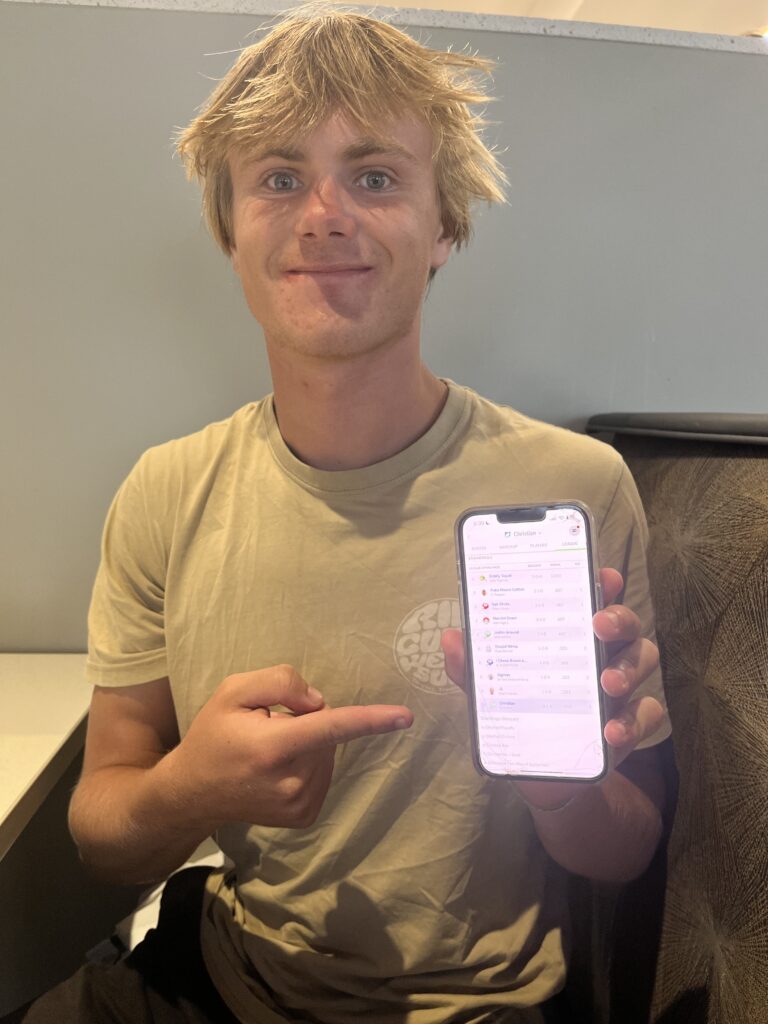Editor’s Note: Isabella VanderYacht is The Point’s business manager.
Having a fantasy football team isn’t all that fun. But watching that team beat somebody else’s is thrilling.
I didn’t start playing fantasy football because I loved watching the NFL. Four seasons ago, I barely watched football. I said “yes” to joining a league because I was bored, and figured doing so would give me something mildly interesting to do in math class. But when the next season rolled around, I agreed again.
“It’s a fun thing to talk to your friends about, even though I don’t really care about football,” Kate Walter, a third-year applied health major, said.
Just like Walter, I don’t care all that much about the NFL, but I still sign up because it’s what happens off the field that makes fantasy football truly matter. It’s the community and competition that comes from it that keeps me coming back year after year.
When I started my first fantasy football team four years ago, I didn’t know how anything worked. I was a rookie, but I quickly learned the basics in a trial-by-fire period of just a few short weeks. What I learned was that fantasy football put me, the “coach,” in control of a virtual team composed of real NFL players who play against other virtual teams. These teams compete and are awarded points based on their players’ on-field performance. If my quarterback throws for a touchdown, those are points for my team. If my wide receiver caught a 60-yard pass, more points for my team.
It’s addicting, heartbreaking and American. But most of all, it’s social. I was hooked.
After four years, I consider myself a seasoned veteran. I’ve seen impossible comebacks, humiliating chokes, hilarious failures and inspiring triumphs.
Isabella VanderYacht, a third-year business marketing and management double major, can relate to these highs and lows of fantasy football.
“I was leading by like 50 points, and I was playing against my aunt, who’s super competitive … her wide receiver and backup running-back absolutely killed it and destroyed me,” VanderYacht said. “That was very frustrating.”

VanderYacht’s story is one that many players can relate to. Despite all this, the most remarkable thing I’ve seen happen with fantasy football has nothing to do with the football field — it’s the way it connects people like nothing else can.
So far this semester, I’ve already seen two strangers sparking up conversations in class over their fantasy teams. I have friends from high school I have nothing in common with, yet I still speak to them weekly about fantasy football. There are pages on social media with hundreds of thousands of followers that are solely dedicated to fantasy football. So the only real question is why? Why does this game bring so many together?
Christian Kuiper, a third-year business major, has a theory for what it is about fantasy football that makes it so social.
“It brings the competitive spirits out of everyone,” Kuiper said. “Every Monday, Thursday and Sunday, a group of people can get together and watch the games. You can watch your players perform and either win or lose, and it just draws you closer together in a friendship.”
A man like me doesn’t throw my hard-earned money around for just anything. But every August, when the commissioner of our league asks me for the $20 buy-in for the league, I don’t hesitate. I don’t think I ever will.
When I was a first-year at Colorado State University, I was having a tough time meeting people. I transferred to Point Loma Nazarene University for my second year, but until the end of that first school year at CSU, I was stuck. You’d be surprised how many days can go by without saying a single word except for “thank you” or “what’s up.” Days fade together, weeks feel like hours.
In my introduction to philosophy class at CSU, I sat next to a fourth-year named Matthew. Matthew was a former lineman in high school, always wore a backwards hat and had a beard that would make Ron Swanson proud. One late-September morning, I had been in the middle of one of my “days without speaking” streaks when I cracked open my laptop, revealing my fantasy football team. Matthew noticed this. He asked about my team, and I asked about his. Conversation began, and my streak was broken. Every Monday, I would come in, and Matthew would ask me how my team did over the weekend. It gave me something to look forward to. To me, that was worth something.
At the end of the day, it’s a game. An app on a phone, a browser tab on a computer screen. Even so, fantasy football hasn’t been so popular for so many years by coincidence. Having community, creating relationships and connecting with people are the things that truly matter in life, and fantasy football is a vessel we can use to achieve these things. No matter how many years in a row I have a bad season, I’ll never regret paying that $20 buy-in, because with it, I’ll always have a reason to talk to my old friends and maybe to meet some new ones, too.
